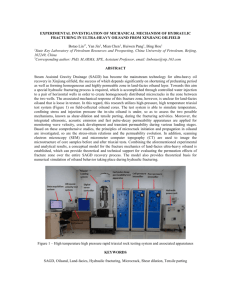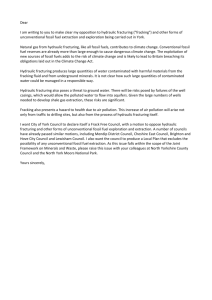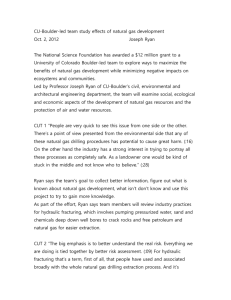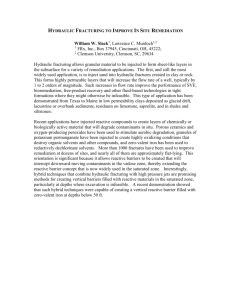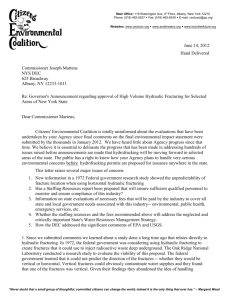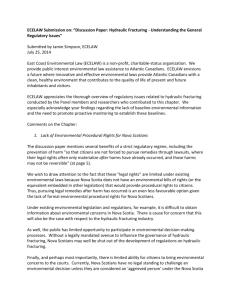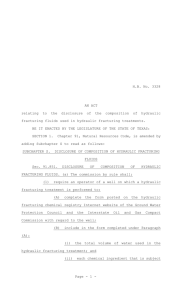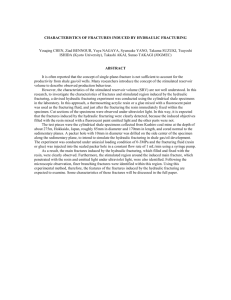bill analysis
advertisement
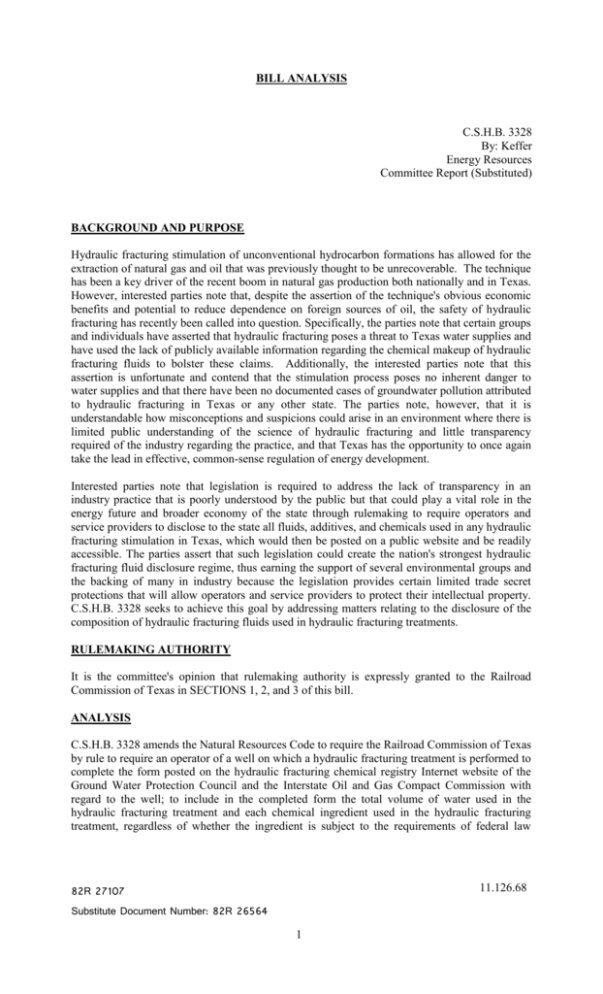
BILL ANALYSIS C.S.H.B. 3328 By: Keffer Energy Resources Committee Report (Substituted) BACKGROUND AND PURPOSE Hydraulic fracturing stimulation of unconventional hydrocarbon formations has allowed for the extraction of natural gas and oil that was previously thought to be unrecoverable. The technique has been a key driver of the recent boom in natural gas production both nationally and in Texas. However, interested parties note that, despite the assertion of the technique's obvious economic benefits and potential to reduce dependence on foreign sources of oil, the safety of hydraulic fracturing has recently been called into question. Specifically, the parties note that certain groups and individuals have asserted that hydraulic fracturing poses a threat to Texas water supplies and have used the lack of publicly available information regarding the chemical makeup of hydraulic fracturing fluids to bolster these claims. Additionally, the interested parties note that this assertion is unfortunate and contend that the stimulation process poses no inherent danger to water supplies and that there have been no documented cases of groundwater pollution attributed to hydraulic fracturing in Texas or any other state. The parties note, however, that it is understandable how misconceptions and suspicions could arise in an environment where there is limited public understanding of the science of hydraulic fracturing and little transparency required of the industry regarding the practice, and that Texas has the opportunity to once again take the lead in effective, common-sense regulation of energy development. Interested parties note that legislation is required to address the lack of transparency in an industry practice that is poorly understood by the public but that could play a vital role in the energy future and broader economy of the state through rulemaking to require operators and service providers to disclose to the state all fluids, additives, and chemicals used in any hydraulic fracturing stimulation in Texas, which would then be posted on a public website and be readily accessible. The parties assert that such legislation could create the nation's strongest hydraulic fracturing fluid disclosure regime, thus earning the support of several environmental groups and the backing of many in industry because the legislation provides certain limited trade secret protections that will allow operators and service providers to protect their intellectual property. C.S.H.B. 3328 seeks to achieve this goal by addressing matters relating to the disclosure of the composition of hydraulic fracturing fluids used in hydraulic fracturing treatments. RULEMAKING AUTHORITY It is the committee's opinion that rulemaking authority is expressly granted to the Railroad Commission of Texas in SECTIONS 1, 2, and 3 of this bill. ANALYSIS C.S.H.B. 3328 amends the Natural Resources Code to require the Railroad Commission of Texas by rule to require an operator of a well on which a hydraulic fracturing treatment is performed to complete the form posted on the hydraulic fracturing chemical registry Internet website of the Ground Water Protection Council and the Interstate Oil and Gas Compact Commission with regard to the well; to include in the completed form the total volume of water used in the hydraulic fracturing treatment and each chemical ingredient used in the hydraulic fracturing treatment, regardless of whether the ingredient is subject to the requirements of federal law 11.126.68 82R 27107 Substitute Document Number: 82R 26564 1 relating to material data safety sheets; to post the completed form on the website or, if the website is discontinued or permanently inoperable, to post the completed form on another publicly accessible Internet website specified by the railroad commission; and to submit the completed form to the railroad commission with the well completion report for the well. The bill requires the railroad commission by rule to require a service company that performs a hydraulic fracturing treatment on a well or a supplier of an additive used in a hydraulic fracturing treatment on a well to provide the operator of the well with the information necessary for the operator to comply with such requirements. C.S.H.B. 3328 requires the railroad commission by rule to prescribe a process by which an entity required to comply with the bill's provisions may designate certain information, including the identity and amount of a chemical ingredient used in a hydraulic fracturing treatment, as a trade secret for purposes of an exception to disclosure under certain Government Code provisions relating to open records, or, if those provisions are repealed, for purposes of federal law relating to trade secrecy claims; to require a person who desires to challenge a claim of entitlement to trade secret protection to file the challenge not later than the second anniversary of the date the relevant well completion report is filed with the railroad commission; and to limit the persons who may challenge a claim of entitlement to trade secret protection to the landowner on whose property the relevant well is located, a landowner who owns property adjacent to property on which the relevant well is located, or a department or agency of this state. C.S.H.B. 3328 requires the railroad commission by rule to prescribe an efficient process for an operator of a well on which a hydraulic fracturing treatment is performed, a service company that performs a hydraulic fracturing treatment on a well, or a supplier of an additive used in a hydraulic fracturing treatment on a well to provide information, including information that is a trade secret, to a health profession or emergency responder who needs the information in accordance with federal law. The bill requires the railroad commission to adopt rules under the bill's provisions not later than January 1, 2012. The bill makes its provisions applicable only to a hydraulic fracturing treatment performed on a well for which an initial drilling permit is issued on or after the date the initial rules adopted by the railroad commission take effect. EFFECTIVE DATE September 1, 2011. COMPARISON OF ORIGINAL AND SUBSTITUTE C.S.H.B. 3328 differs from the original by setting out provisions relating to disclosure of the composition of hydraulic fracturing fluids and requiring the Railroad Commission of Texas to adopt rules relating to these requirements, whereas the original sets out the disclosure provisions in greater procedural detail and does not expressly grant rulemaking authority to any entity. C.S.H.B. 3328 differs from the original by omitting a provision specifying that information submitted to the railroad commission as part of service company or operator disclosures is public information unless the information is entitled to be withheld as a trade secret. The substitute contains provisions not included in the original, as provided by railroad commission rule, specifying a filing deadline for a person who desires to challenge a claim of entitlement to trade secret protection and limiting who may challenge a claim of entitlement to trade secret protection. C.S.H.B. 3328 omits a provision included in the original specifying that a person performing hydraulic fracturing treatments in this state is required to disclose and maintain an updated master list of certain information relating to the composition of the hydraulic fracturing fluid. C.S.H.B. 3328 omits a provision included in the original prohibiting an operator from using the services of another person in performing a hydraulic fracturing treatment in this state unless the 11.126.68 82R 27107 Substitute Document Number: 82R 26564 2 other person is in compliance with the requirements of service company disclosures. C.S.H.B. 3328 omits a provision included in the original authorizing the railroad commission to disclose information otherwise subject to trade secret protection to a third-party testing firm for certain purposes and to use the results of a test conducted by such a firm in any manner the railroad commission considers necessary to protect public health and the environment. C.S.H.B. 3328 omits provisions included in the original defining "additive," "base fluid," "Chemical Abstracts Service" or "CAS," "chemical constituent," "hydraulic fracturing fluid," "hydraulic fracturing treatment," "operator," "proppant," "trade secret," "well," and "well completion report." C.S.H.B. 3328 differs from the original by making its provisions applicable only to a hydraulic fracturing treatment performed on a well for which an initial drilling permit is issued on or after the date the initial rules adopted by the railroad commission take effect, whereas the original makes such provisions applicable on or after the bill's effective date. 11.126.68 82R 27107 Substitute Document Number: 82R 26564 3
